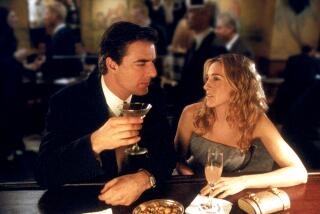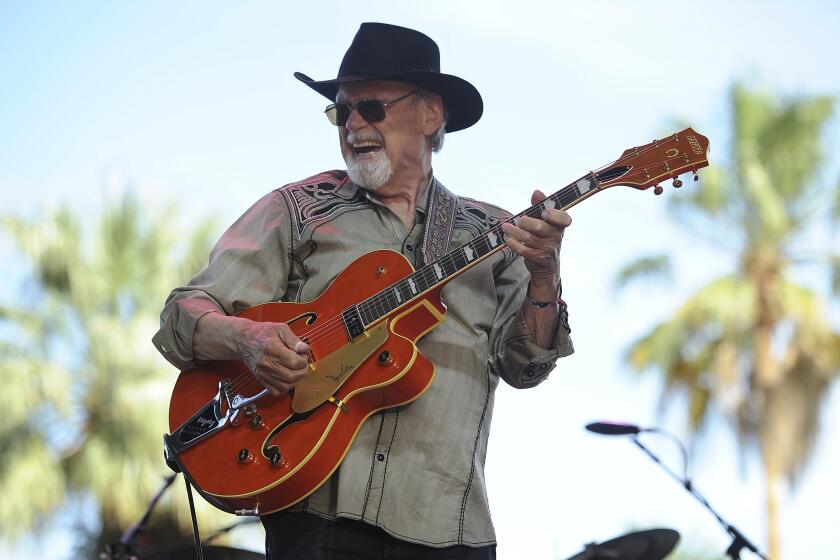Review: ‘Aquarius’ reveals flip side of Summer of Love
Here come the 1960s again. Yes, you’re tired of hearing about them, just like I’m tired of hearing about the 1820s. Now that “Mad Men” has ended, having tired of the ‘60s itself, you might have thought you were getting a break from them. You might have thought wrong.
In mid-June, ABC’s “The AstronautWives Club” will take viewers back to the early part of that decade, the bright and hopeful part, when Don Draper still had Betty to cheat on. But first, premiering Thursday, is NBC’s “Aquarius,” as in the Age of. It’s set in 1967, the year of the so-called Summer of Love, and Charles Manson is in it.
Not Charles Manson himself, of course. He is still in prison and will stay there; he used to show up on television every so often, interviewed under cover of journalistic inquiry, but that doesn’t happen so much anymore. Still, though they grow vaguer with time, his name and face persist in the culture as shorthand for a certain kind of boogeyman, a pied piper of death, and a lasting avatar of What Went Wrong with the 1960s — the Bummer of Love.
Anyway, here he is, played as you’ve never seen him before, by Gethin Anthony, who has the right slight build but is a shade too attractive and kempt — a character not in a dramatic re-creation of actual events, but a fact-informed fantasia that mixes real people and happenings into a period police drama.
At the center of that drama, created by John McNamara, is detective Sam Hodiak (David Duchovny), a good homicide cop who is in some respects behind his time and some respects ahead of it. He encourages policewoman Charmain Tully (Claire Holt), whom his colleagues call a “pretty little thing” and only ask to get them coffee. (That isn’t strictly true. They also ask her why she isn’t married.)
And when colleague Brian Shafe (the appealing Grey Damon), a shaggy undercover cop who is Hodiak’s occasional partner, comes back from a gay bar disturbed at the thought of “men doing that with men,” Hodiak asks him, “What do you care what they do with each other?” But he also bends rules and busts heads and generally runs over whatever stands between him and closing a case.
The series proceeds on multiple tracks. There are complicated family relations, twisty sexual entanglements and cases that come and go, while Charlie waits offstage, as in a routine episodic police procedural. These include a case based on the murder of actor Ramon Novarro; double murders of black and white partnered cops; and a priest stealing money from his church.
The Manson story and its attendant subplots continue, in the forefront or background, through all 13 episodes. (NBC will make available all at once on Friday, a la Netflix.) This thread begins when an old girlfriend (Michaela McManus) asks Hodiak to find her missing daughter (Emma Dumont), and it will draw in the girl’s father (Brian F. O’Byrne), a powerful lawyer and Republican Party wannabe — exactly the sort of father kids run from in stories like this — in ways that are surprising, shading toward unbelievable.
Indeed, the plot can seem quite mad at times, without necessarily catching the particular madness that informed the age. The series does tick off the social and historical bullet points: Vietnam and the antiwar movement, black power, drugs, even the Sunset Strip curfew riots, which form the background of an early scene. And yet it all seems a little too tidy, a little too secondhand.
Indeed, the series works best when it stays clear of the issues and concentrates on individuals, acting as people do. (This was true of “Mad Men” too, after all.) The more strongly it indicates the era, the more it resembles an old episode of “Dragnet.”
But the biggest hurdle may be Manson himself, with his pitiful impossible dream of being “bigger than the Beatles,” the dream whose thwarting led in a roundabout way to what we call the Manson murders. We insist on making him into something big, if only for the sake of the monster movie, but his fame proceeds mainly from the fame of his victims. This was a Hollywood story in the press. There is less to him than meets the eye.
------------
‘Aquarius’
Where: NBC
When: 9 p.m. Thursday
Rating: TV-14-LSV (may be unsuitable for children under the age of 14, with advisories for coarse language, sex and violence)
More to Read
The biggest entertainment stories
Get our big stories about Hollywood, film, television, music, arts, culture and more right in your inbox as soon as they publish.
You may occasionally receive promotional content from the Los Angeles Times.







